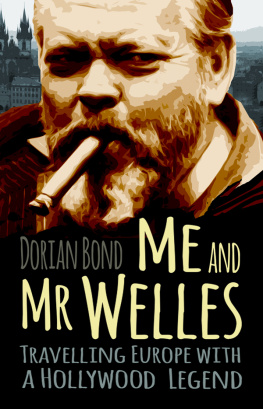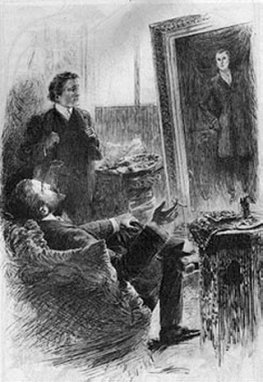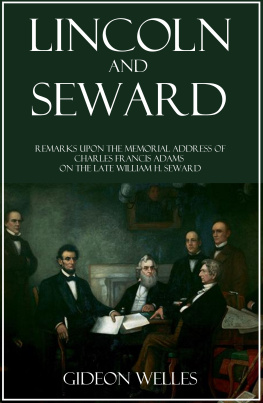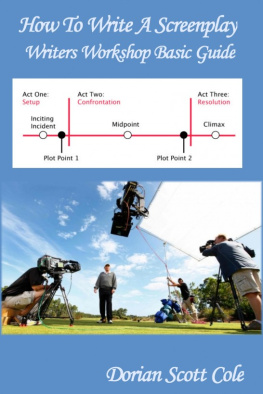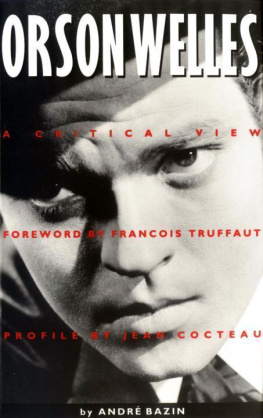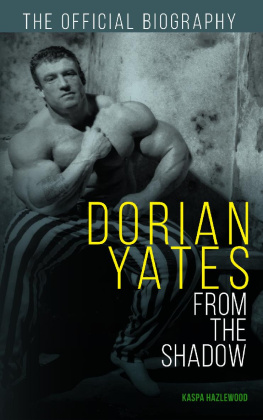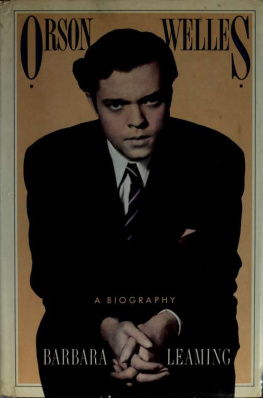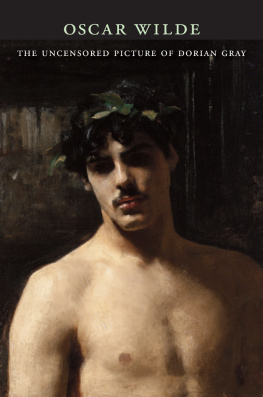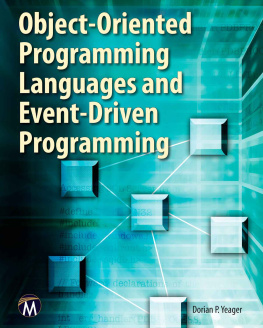Dorian Bond - Me and Mr Welles
Here you can read online Dorian Bond - Me and Mr Welles full text of the book (entire story) in english for free. Download pdf and epub, get meaning, cover and reviews about this ebook. year: 2018, publisher: The History Press, genre: Non-fiction / History. Description of the work, (preface) as well as reviews are available. Best literature library LitArk.com created for fans of good reading and offers a wide selection of genres:
Romance novel
Science fiction
Adventure
Detective
Science
History
Home and family
Prose
Art
Politics
Computer
Non-fiction
Religion
Business
Children
Humor
Choose a favorite category and find really read worthwhile books. Enjoy immersion in the world of imagination, feel the emotions of the characters or learn something new for yourself, make an fascinating discovery.
- Book:Me and Mr Welles
- Author:
- Publisher:The History Press
- Genre:
- Year:2018
- Rating:5 / 5
- Favourites:Add to favourites
- Your mark:
- 100
- 1
- 2
- 3
- 4
- 5
Me and Mr Welles: summary, description and annotation
We offer to read an annotation, description, summary or preface (depends on what the author of the book "Me and Mr Welles" wrote himself). If you haven't found the necessary information about the book — write in the comments, we will try to find it.
Me and Mr Welles — read online for free the complete book (whole text) full work
Below is the text of the book, divided by pages. System saving the place of the last page read, allows you to conveniently read the book "Me and Mr Welles" online for free, without having to search again every time where you left off. Put a bookmark, and you can go to the page where you finished reading at any time.
Font size:
Interval:
Bookmark:



For my darling wife, with love and appreciation.
Front Cover: The habitual cigar. (Authors Collection)
First published 2018
The History Press
The Mill, Brimscombe Port
Stroud, Gloucestershire, GL5 2QG
www.thehistorypress.co.uk
Dorian Bond, 2018
The right of Dorian Bond to be identified as the Author of this work has been asserted in accordance with the Copyright, Designs and Patents Act 1988.
All rights reserved. No part of this book may be reprinted or reproduced or utilised in any form or by any electronic, mechanical or other means, now known or hereafter invented, including photocopying and recording, or in any information storage or retrieval system, without the permission in writing from the Publishers.
British Library Cataloguing in Publication Data.
A catalogue record for this book is available from the British Library.
ISBN 978 0 7509 8586 4
Typesetting and origination by The History Press
Printed in Great Britain
eBook converted by Geethik Technologies
This memoir has been written about events that happened fifty years ago, during the 1960s. The Six-Day War in the Middle East, had just been and gone as I took my final student exams and we were in the midst of what The New Yorker has called one of the most tumultuous decades of the twentieth century. So, the reader must forgive inaccuracies on exact dates, but the vast majority of it was taken from my increasingly accurate memory and the copious notes I took at the time in my little hotel room in Rome. It is all true. It is all history, although Orson Welles was dubious about written history, saying it was always written by the winners.
But I was not a winner, or a loser in these events. I was merely a participant a witness. It was all a remarkable experience with a remarkable man, which I still cherish to this day. To paraphrase Hemingway, if you are lucky enough to have worked for Orson Welles as a young man, then the experience will go with you for the rest of your life, for Orson Welles is a moveable feast.
A feast he was, and I ate my fill.
There are few giants in this world of pygmies and he was one. To quote Shakespeares Cassius:
He doth bestride the narrow world
Like a Colossus, and we petty men
Walk under his huge legs and peep about
To find ourselves dishonourable graves.
The boy who grew up in Kenosha, Wisconsin, attended the Todd School outside Chicago, turned down a scholarship to Harvard and instead headed out into the world to seek his fame and his fortune, was truly a renaissance man.
His ashes now lie in faraway Andalusia, free from the chaos of his life and the art which gave us all such a unique vision. I was lucky enough to have been up close and personal with him. I salute his memory. As he always said to me, Nobody gets justice. People only get good luck or bad luck.
I lived long enough in China to realise that he was dead right. The Chinese set great store on luck, but what supersedes success or failure is the importance of being true to yourself. Orson Welles never let us down in this respect, so I originally thought of calling this book, The Importance of Being Orson.
Whatever its called doesnt really matter. Its about him.
Dorian Bond
Winchester, England, 2018
The time has come, the Walrus said,
To talk of many things:
Of shoes and ships and sealing-wax
Of cabbages and kings
And why the sea is boiling hot
And whether pigs have wings.
Lewis Carroll
Dorian St George Bond! With a name like that, youve just gotta be a movie director! roared Orson Welles. When Orson Welles roared, it could be heard a mile away. Literally.
He was towering over me, which he obviously would do, given that he was a good 6ft something in his socks I was a flattering 5ft 8in, and anyway, he was standing on the side of a luxury sailing yacht already a couple of feet above the level of the jetty I was standing, or cowering, on.
He was wearing the famous black fedora hat, a black shirt buttoned to the collar, a black suit and black shoes. He was not to wear anything else during the time I was with him. It was a kind of style or uniform that he was comfortable with. It looked good. A Montecristo was sticking out of his mouth, half smoked and half chewed.
All in all, he was a magnificent figure, the image very much reflecting the legend. He might as well have been Charles Foster Kane.
*
Can you go to Yugoslavia tomorrow for Orson Welles?
Yes, I answered, without missing a beat. They say to be impulsive is a bad thing. This time it was definitely a good thing.
The telephone had just rung and an old ladys voice, very Miss Marple, had asked, Is that Dorian Bond? I had said yes and she had continued, My name is Ann Rogers, Im Orson Welless private secretary. Can you go to Yugoslavia tomorrow for Mr Welles?
I confirmed my original reply.
It was the late autumn of 1968: the Battle of Khe Sanh had been fought and lost, and the Tet Offensive had finally been suppressed after savage combat in Hu, immortalised by those dramatic Don McCullin photographs of US Marines fighting and dying in the ruins of the ancient city. In March, I had taken part in the protest against the war in Vietnam which ended with violence in Grosvenor Square. In April, Martin Luther King had been assassinated in Memphis, while in May, Danny Cohn-Bendit had manned the barricades in Paris, and in June, Bobby Kennedy had been assassinated in Los Angeles.
The Prague Spring, which had brought us the sympathetically sad face of Alexander Dubek, had blossomed on his accession to power in January and died with the Eastern Bloc armed forces brutally suppressing the Czechoslovak people at the end of August as the West looked on. Yale had decided to accept women undergraduates, and Richard Nixon had been elected president, completing his comeback from his close-run defeat to Kennedy in 1960 and the humiliation of his failure to win the governorship of California in 1964. Finally, the Troubles in Northern Ireland were just about to begin.
I had sat next to Paul McCartney and Jane Asher and been introduced to Eric Burden, he of Rising Sun fame, at the legendary Scotch in Masons Yard in St Jamess, that cooler than cool place where Jimi Hendrix had played his first time in London, where the Rolling Stones hung out and where McCartney met Stevie Wonder. I really thought I had my finger on the pulse of contemporary London.
It was a long time ago. Or so it seems to me now.
One evening, I had supper with two friends of mine from university. He had started in the considered world of publishing while she was drifting from job to job. Fiona told me that she had just run an errand for Orson Welles.
Orson Welles? I nearly choked on my mouthful of goulash. You ran an errand for Orson Welles? Amazing! Did you actually meet him?
Yes, she said airily as if it was the most normal thing in the world to do, run an errand for Orson Welles.
I have to point out to you here that I was at film school, where Orson Welles was not merely a mortal man he was worshipped as a god by teachers and students alike. There were posters of him in his fedora all around; in fact, those black and white images of him in a number of his films fitted seamlessly on the dank, blackened brick walls of the film school which had once been a fruit and vegetable warehouse. You almost expected him to appear out of the shadows, like Harry Lime, as you mounted the dark stone stairs or turned any corner.
Font size:
Interval:
Bookmark:
Similar books «Me and Mr Welles»
Look at similar books to Me and Mr Welles. We have selected literature similar in name and meaning in the hope of providing readers with more options to find new, interesting, not yet read works.
Discussion, reviews of the book Me and Mr Welles and just readers' own opinions. Leave your comments, write what you think about the work, its meaning or the main characters. Specify what exactly you liked and what you didn't like, and why you think so.

